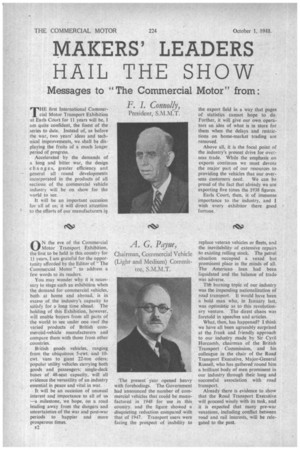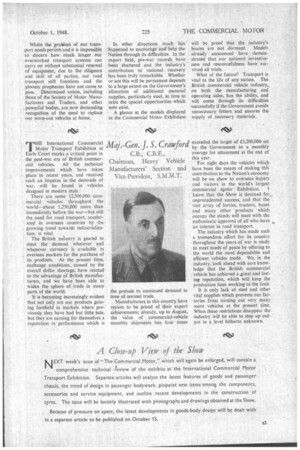. A. G. Payne,
Page 80

Page 81

If you've noticed an error in this article please click here to report it so we can fix it.
Chairman, Commercial Vehicle (Light and Medium) Committee, S.M.M.T.
0 N the eve of the Commercial Motor Transport Exhibition, the first to be held in this country for II years, 1 am grateful for the opportunity afforded by the Editor of " The Commercial Motor" to address a few words to its readers.
You may wonder why it is necessary to stage such an exhibition when the demand for commercial vehicles, both at home and abroad, is in excess of the industry's capacity to satisfy for a long time ahead. The holding of this Exhibition, however, will enable buyers from all parts of the world to see under one roof the varied products of British commercial-vehicle manufacturers and compare them with those from other countries.
British goods vehicles, ranging from the ubiquitous 5-cwt. and 10cwt, vans to giant 22-ton oilers; popular utility vehicles carrying both goods and passengers; single-deck buses of 48-seat capacity, will all evidence the versatility of an industry essential in peace and vital in war.
It will be an occasion of unusual interest and importance to all of us —a milestone, we hope, on a road leading away from the dangers and uncertainties of the War and post-war periods to happier and more prosperous times.
E2
The present year opened heavy with forebodings. The Government had announced the number of commercial vehicles that could be manufactured in 1948 for use in this country. and the figure showed a disquieting reduction compared with that of 1947. Transport users were facing the prospect of inability to
replace veteran vehicles or fleets, and the inevitability of extensive repairs to existing rolling stock. The petrol situation occupied a vexed but prominent place in the minds of all. The American loan had been liquidated and the balance of trade was adverse.
The burning topic of our industry was the impending nationalization of road transport. It would have been a bold man who, in January last, was optimistic as to this revolutionary venture. The direst chaos was foretold in speeches and articles.
What, then, has happened? I think we have all been agreeably surprised at the frank and friendly approach to our industry made by Sir Cyril Hurcomb, chairman of the British Transport Commission, and his colleague in the chair of the Road Transport Executive, Major-General Russell, who has gathered'round him a brilliant body of men prominent in our industry through their long and successful association with road transport.
Already there is evidence to show that the Road Transport Executive will proceed wisely with its task, and it is expected that many pre-war vexations, including conflict between road and rail interests, will be relegated to the past, Whilst the proWem of our transport needs persists and it is impossible to discern how much longer our overworked transport systems can carry on without substantial renewal of equipment, due to the diligence and skill of all parties, our road transport still functions and the gloomy prophecies have not come to pass. Determined voices, including those of the Society of Motor Manufacturers and Traders, and other powerful bodies, are now demanding recognition of the need to replace our worn-out vehicles at home. In other directions much has happened to encourage and help the Nation through its difficulties. In the export field, pre-war records have been shattered and the industry's contribution to national recovery has been truly remarkable. Whether or not this will be permanent depends to a large extent on the Government's allocation of additional material supplies, particularly steel, in time to seize the special opportunities which now exist.
A glance at the models displayed at the Commercial Motor Exhibition will be proof that the industry's brains are not dormant. Models already announced have demonstrated that our national inventiveness and resourcefulness have survived all trials.
What of the future? Transport is vital to the life of any nation. The British commercial vehicle industry,, on both the manufacturing and operating sides, has the ability, and will come through its difficulties successfully if the Government avoids unnecessary fetters and ensures the supply of necessary materials.












































































































































































































































